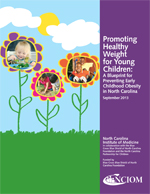 RALEIGH – With obesity rates at an all time high and health costs increasing, researchers from the UNC Center for Health Promotion and Disease Prevention (HPDP) recently participated in a task force convened by the North Carolina Institute of Medicine (NCIOM) to draft strategies that would target the epidemic at its roots –the state’s youngest children birth to five. The task force issued recommendations that would bring together parents, child care providers, health professionals and the community to promote healthy eating and physical activity in children.
RALEIGH – With obesity rates at an all time high and health costs increasing, researchers from the UNC Center for Health Promotion and Disease Prevention (HPDP) recently participated in a task force convened by the North Carolina Institute of Medicine (NCIOM) to draft strategies that would target the epidemic at its roots –the state’s youngest children birth to five. The task force issued recommendations that would bring together parents, child care providers, health professionals and the community to promote healthy eating and physical activity in children.
“Attacking the causes of obesity with our youngest children is key to creating a healthier North Carolina and improving long-term health,” said Pam Silberman, president and CEO of the NCIOM. “Addressing the causes of obesity among our citizens is necessary to improve quality of life, to reduce chronic disease, and to limit rising health costs. The Task Force recognized that no single strategy could address this complex issue, but a collaborative effort including health care professionals, child care providers, families and community organizations could have a significant impact.”
Although obesity rates have started to stabilize in the last year, North Carolina, like much of the nation, has experienced a dramatic increase in rates of obesity over the last three decades, leading to increased rates of heart disease, diabetes and other chronic diseases. The North Carolina Pediatric Nutrition Surveillance System, which collects data on low-income children ages 0-5 years, shows that the obesity epidemic affects even the youngest individuals in the state. Roughly 3 out of every 10 young low-income children ages 2-4 years are either overweight or obese in North Carolina. Obese children are at increased risk for elevated cholesterol, insulin, and blood pressure; sleep apnea; bone and joint problems; and social and psychological problems.
Early childhood obesity is linked to obesity rates of older children and eventually adults. Children who are obese by age 6 years or overweight by age 12 years have greater than a 50% likelihood of becoming obese adults. According to a 2013 report by the Trust for America’s Health, almost a third of adult North Carolinians are obese.
Alice Ammerman, DrPH, director of HPDPP and professor of nutrition in Gillings School of Global Public Health and Dianne Ward, EdD, also a professor of nutrition and a research fellow at HPDP, served on the task force.
Ward’s research at HPDP focuses on obesity prevention in early childhood, particularly in child care settings. She leads the Nutritional and Physical Activity Self -Assessment for Child Care (NAP SACC), which has been recognized by the White House Take Force on Childhood Obesity and the Center of Excellence for Training and Research Translation as an effective and evidence-based intervention to prevent childhood obesity.
“Children deserve the opportunity to grow up in healthy environments,” said Ward. “The beauty of the NC IOM’s Task Force recommendations to address early childhood obesity lies in the multi-agency collaborations used for their creation. I am pleased that several of the recommendations address early care and education settings. The report recommends community and environmental strategies that are supported by our NAP SACC-based research.”
The taskforce issued a number of recommendations, including:
1. Improve the treatment and prevention of early childhood obesity in health care settings:
- Strengthen education for health care professionals on treating and preventing obesity during both school and post graduate training as well as through continuing education.
- Ensure adherence of insurers/payers to the Affordable Care Act requirements for coverage of the prevention, diagnosis, and treatment of obesity.
- Create a clearinghouse of core statewide and local services, resources and supports for health professionals to refer families and children.
2. Integrate healthy activities into child care settings:
- Create incentives for implementation of evidence-based strategies into programs and policies in child care centers located in counties with high obesity rates among children.
- Provide education for child care providers on strategies for physical activity and nutrition, as well as cross-training on activity and nutrition for child care consultants.
- Create a voluntary recognition program for child care programs and early education programs that meet enhanced physical activity and nutrition standards.
3. Utilize community resources to reduce childhood obesity:
- Expand the focus of Eat Smart, Move More North Carolina to promote healthy weight among young children and their families.
- Develop a communications campaign to support policy and behavior change to reduce early childhood obesity.
- Enhance family education through existing maternal, infant, and early childhood home visiting and family strengthening programs.
- Encourage state agencies to focus on healthy community design, including access to healthy, affordable food and opportunities for physical activity.
4. Expand the collection and reporting of physical activity and nutrition data.
- Improve the collection and reporting of physical activity and nutrition data to more fully promote healthy weight among young children.
- Improve the collection of BMI data for young children and make the information widely available in order to evaluate existing programmatic and policy initiatives and to inform future ones.
The full report is available at https://nciom.org/promoting-health-weight-for-young-children-a-blueprint-for-preventing-early-childhood-obesity-in-north-carolina/.
For more information, contact Sonya Sutton, HPDP Communications Specialist, at ssutton@unc.edu; 919-966-4118
